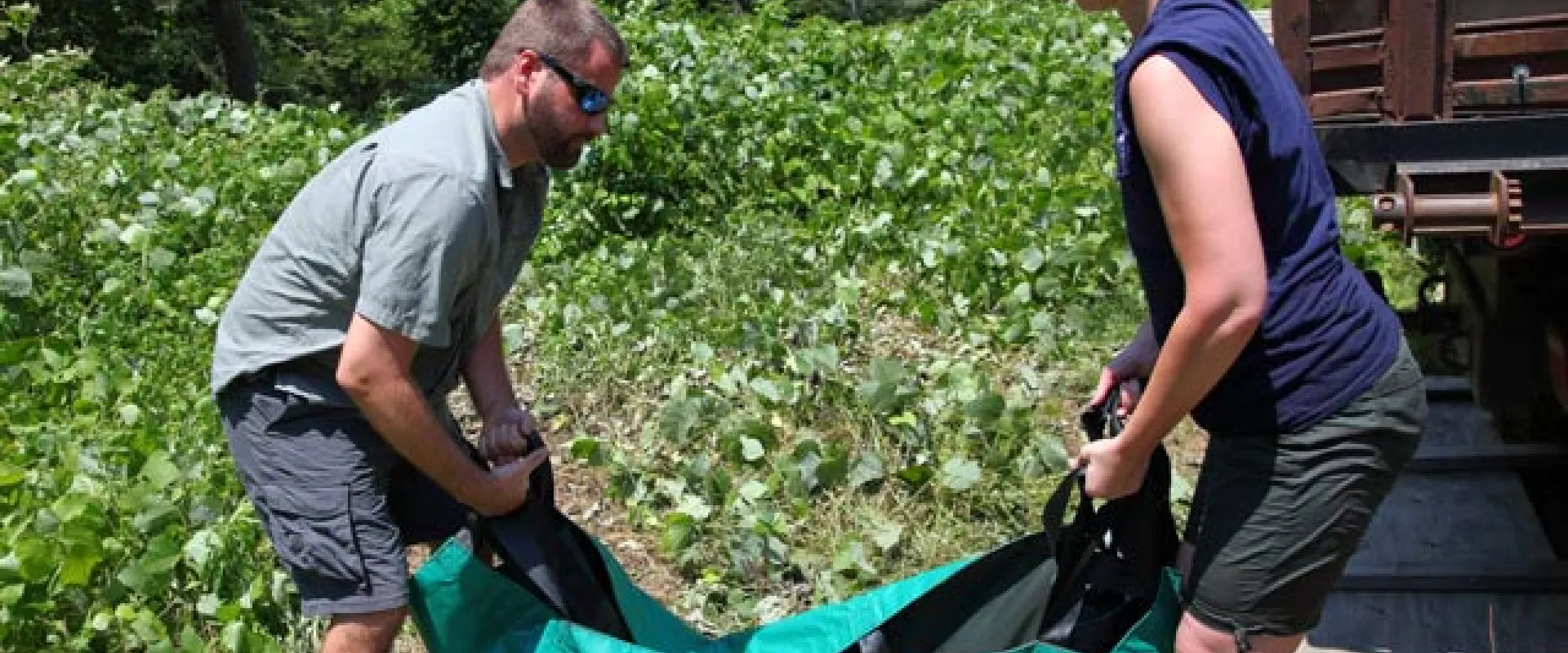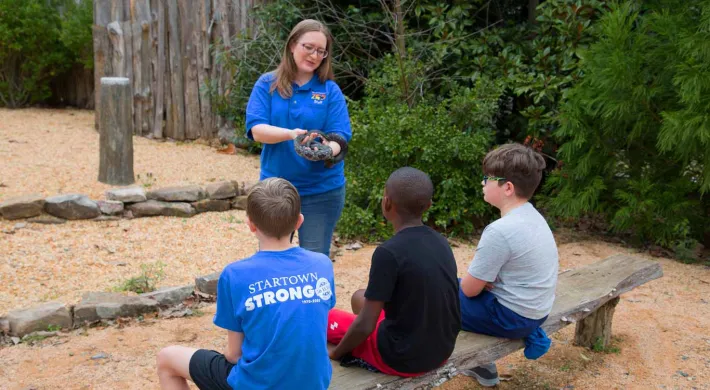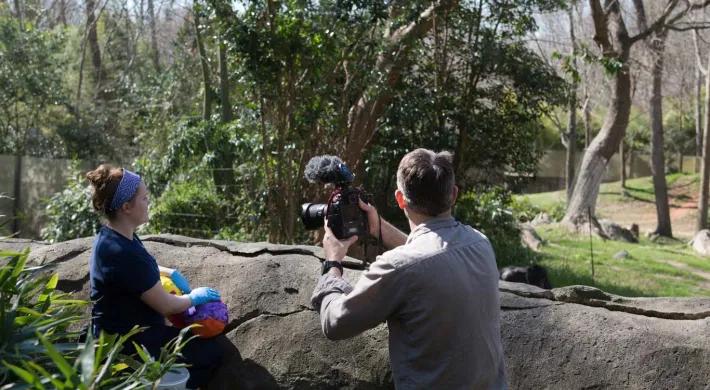Overview: At the North Carolina Zoo, we are committed to protecting wildlife and other natural resources. Through the Regional Conservation portion of our Living With Nature Live! events, our goal is to show middle and high school students the many ways we work to conserve. This year we are focusing on a turtle research project here at the Zoo and how siltation is affecting hellbenders in our mountains.
Activities offered for classrooms can be used by teachers as they apply to their class. Pre-activities and post-activities are meant to help support and enrich the learning that takes place during the Live Broadcast. All are optional but strongly encouraged in order to align with the standards provided.
Date of Event: Wednesday September 29, 2021 10:00 am (EST)
Designed For: Middle School and High Schools Students (see NC Standard Course of Study alignments below)
Objectives
- The student will be able to identify and describe two regional practices as offered by the North Carolina Zoo: turtle tracking in natural lands and creating homes for hellbender salamanders.
- The student will be able to participate in research practices involved in native turtle identification and monitoring.
- The student will be able to understand the process of siltation and how it affects salamanders.
- The student will participate in a collaborative group to complete projects related to regional conservation.
Video of Live Event Available Below
Teacher Information (All Grades):
Our North Carolina Conservation portion of our Live will be broadcast via Zoom on Wednesday, September 29, 2021 at 10 am. It will last approximately 30 minutes.
In order to set the foundation for the material we will cover when live, we encourage you to use the pre-event activities. This will help prime the learning pump for students. These activities are optional but will allow your students to begin considering what they may be able to do to support regional conservation.
You can use the Regional Conservation site to inform yourself of what is already happening at the North Carolina Zoo. This will give you good background knowledge prior to the event.
Please note: While there will be plenty of opportunity for interaction with our live event hosts, we ask that you work with your students before and after the event to keep the learning and exploration going!
Suggested Activities
The following activities are offered as suggestions to engage students’ prior knowledge and prepare them for their virtual trip to the North Carolina Zoo to learn about North America Conservation. After their virtual trip, classes or groups will be encouraged to work on their own Regional Conservation project. See the Post-Event suggestions for details.
Prior to Event
- Research hellbender habitats and breeding and come with at least one question to ask during the live event.
- Using the below website as a resource, figure out what turtles we are most likely to see during our live event and why.
Watch the Providing Homes for Hellbenders video by Untamed Science.
Consider a conservation practice that you would like to put in to practice in your own community. List out your major questions about this practice as well as plans for how you could affect change in your own area.
Learn more about Conservation at the Zoo or read the North Carolina Zoo Conservation Report to see what we are doing to help North Carolina wildlife.
During Event
The linked worksheet is designed to help students engage with the material presented during the live broadcast. The front page focuses on the problems hellbenders are facing and the backside is an example of the data our researchers collect during their turtle monitoring. We recommend you make copies of the worksheet for your class to use during the live event.
Post Event
- Create a booklet about some of the common species of salamanders in your region as a class or by yourself. Each salamander should have a drawing of the animal, how to ID them, their range, and some basic facts.
- Go turtle or salamander spotting and keep a written or photo record of where, when, and what you find over the course of several weeks. Compare and contrast the weeks.
- Good resource for salamanders https://files.nc.gov/ncparks/37/Salamander-ID-Sheets.pdf
- As a class (or team, or grade level, etc.), decide on a conservation practice that you could implement in your community or continue the project that you started. Then, create and submit a digital poster to the Zoo to advertise what your group plans to do to conserve. When creating, think about using a format similar to what you see here.
For submissions questions or further information email schoolprograms@nczoo.org.
6th Grade
Science
NCSOS
- 6.L.2.3 Summarize how the abiotic factors (such as temperature, water, sunlight, and soil quality) of biomes (freshwater, marine, forest, grasslands, desert, Tundra) affect the ability of organisms to grow, survive and/or create their own food through photosynthesis.
NGSS
- MS-LS2-1 Analyze and interpret data to provide evidence for the effects of resource availability on organisms and populations of organisms in an ecosystem.
- MS-LS2-4 Construct an argument supported by empirical evidence that changes to physical or biological components of an ecosystem affect populations.
- MS-LS2-5 Evaluate competing design solutions for maintaining biodiversity and ecosystem services.
- MS-ESS3-3 Apply scientific principles to design a method for monitoring and minimizing a human impact on the environment.
ELA
W.6.1. Write claims about topics or text. a. Write a claim about a topic or text. b. Write one or more reasons to support a claim about a topic or text
W.6.2 Write to share information supported by details. a. Introduce a topic and write to convey ideas and information about it including visual, tactual, or multimedia information as appropriate. b. Provide facts, details, or other information related to the topic.
W.6.5 Conduct short research projects to answer a question.
7th Grade
Science
NCSOS
- 7.L.2.3 Explain the impact of the environment and lifestyle choices on biological inheritance (to include common genetic diseases) and survival
NGSS
- MS-LS2-1 Analyze and interpret data to provide evidence for the effects of resource availability on organisms and populations of organisms in an ecosystem.
- MS-LS2-4 Construct an argument supported by empirical evidence that changes to physical or biological components of an ecosystem affect populations.
- MS-LS2-5 Evaluate competing design solutions for maintaining biodiversity and ecosystem services.
- MS-ESS3-3 Apply scientific principles to design a method for monitoring and minimizing a human impact on the environment.
ELA
W.7.1 Write claims about topics or texts. a. Introduce a topic or text and write one claim about it. b. Write one or more reasons to support a claim about a topic or text. c. Use temporal words (first, next, also) to create connections.
W.7.2 Write to share information supported by details. a. Introduce a topic and write to convey ideas and information about it including visual, tactual, or multimedia information as appropriate. b. Provide facts, details, or other information related to the topic. c. Select domain-specific vocabulary to use in writing about the topic.
W.7.5 Conduct research to answer a question based on multiple sources of information.
8th Grade
Science
NCSOS
- 8.L.1 Understand the hazards caused by agents of diseases that effect living organisms.
- 8.L.3 Understand how organisms interact with and respond to the biotic and abiotic components of their environment.
- 8.E.1 Understand the hydrosphere and the impact of humans on local systems and the effects of the hydrosphere on humans.
NGSS
- MS-LS2-1 Analyze and interpret data to provide evidence for the effects of resource availability on organisms and populations of organisms in an ecosystem.
- MS-LS2-4 Construct an argument supported by empirical evidence that changes to physical or biological components of an ecosystem affect populations.
- MS-LS2-5 Evaluate competing design solutions for maintaining biodiversity and ecosystem services.
- MS-ESS3-3 Apply scientific principles to design a method for monitoring and minimizing a human impact on the environment.
ELA
W.8.1 Write claims about topics or texts. a. State the claim and provide reasons or pieces of evidence to support it. b. Write reasons to support a claim about a topic or text. c. Use temporal words (first, next, also) to create connections.
W.8.2 Write to share information supported by details. a. Introduce a topic clearly and write to convey ideas and information about it including visual, tactual, or multimedia information as appropriate. b. Write one or more facts or details related to the topic. c. Write complete thoughts as appropriate. d. Use domain specific vocabulary related to the topic. e. Provide a closing.
W.8.5 Conduct short research projects to answer and pose questions based on multiple sources of information.
Earth/Environmental Science (High School)
- EEn 2.1.3 – Explain how natural actions, such as weather, erosion, and soil formation will affect Earth’s surface.
- EEn.2.4.2 Evaluate human influences on water quality in North Carolina’s river basins, wetlands and tidal environments.
Biology (High School)
NCSOS (Biology)
- Bio.2.1 Analyze the interdependence of living organisms within their environments
- Bio.2.2 Understand the impact of human activities on the environment (one generation affects the next).
NGSS
- HS-LS2-7 Design, evaluate, and refine a solution for reducing the impacts of human activities on the environment and biodiversity.
- HS-LS4-6 Create or revise a simulation to test a solution to mitigate adverse impacts of human activity on biodiversity.
- HS-ESS3-4 Evaluate or refine a technological solution that reduces impacts of human activities on natural systems.
ELA (High School)
9-10
W.9-10.1 Write claims about topics or texts. a. Introduce a topic or text and write one claim and one counterclaim about it
W.9-10.2 Write to share information supported by details. a. Introduce a topic clearly and use a clear organization to write about it including visual, tactual, or multimedia information as appropriate. b. Develop the topic with facts or details. c. Use complete, simple sentences as appropriate. d. Use domain specific vocabulary when writing claims related to a topic of study or text. e. Providing a closing or concluding statement.
W.9-10.5 Conduct research projects to answer questions posed by self and others using multiple sources of information.
11-12
W.11-12.1 Write arguments to support claims. a. Write an argument to support a claim that results from studying a topic or reading a text. b. Support claims with reasons and evidence drawn from text. c. Provide a closing or concluding statement.
W.11-12.2 Write to share information supported by details. a. Introduce a topic clearly and write an informative or explanatory text that conveys ideas, concepts, and information including visual, tactual, or multimedia information as appropriate. b. Develop the topic with relevant facts, details, or quotes. c. Use complete, simple sentences, as well as compound and other complex sentences as appropriate. d. Use domain specific vocabulary when writing claims related to a topic of study or text. e. Provide a closing or concluding statement.
W.11-12.5 Conduct research projects to answer questions posed by self and others using multiple sources of information.


